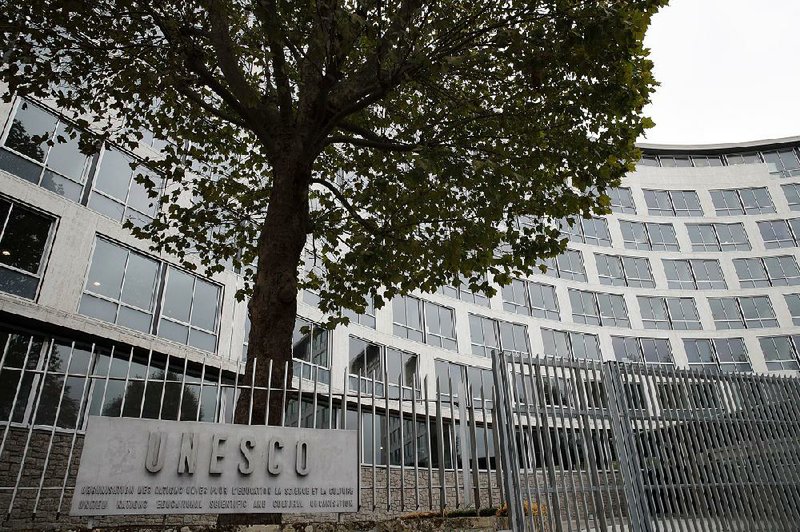JERUSALEM -- Israel suspended cooperation with UNESCO on Friday, a day after the United Nations cultural agency adopted a draft resolution that Israel says denies the deep historic Jewish connection to holy sites in Jerusalem.
UNESCO's draft resolution, titled "Occupied Palestine" and sponsored by several Arab countries, uses only the Islamic name for a hilltop compound sacred to both Jews and Muslims, which includes the Western Wall, a remnant of the biblical temple and the holiest site where Jews can pray. The validated resolution is expected early next week, but the wording is unlikely to change.
The draft resolution diminished the links to Judaism of two important holy sites in Jerusalem's Old City.
The text refers to the site known by Muslims as the Noble Sanctuary and by Jews as the Temple Mount only by its Muslim name. The draft resolution refers to the Muslim site of Al-Buraq Plaza without quotations, but puts the site's Jewish name, the Western Wall Plaza, in quotations.
Education Minister Naftali Bennett informed UNESCO of Israel's decision on Friday.
"Following the shameful decision by UNESCO members to deny history and ignore thousands of years of Jewish ties to Jerusalem and the Temple Mount, I have notified the Israel National Commission for UNESCO to suspend all professional activities with the international organization," Bennett said.
Jerusalem Mayor Nir Barkat said he was "outraged" by the resolution. "Would UNESCO vote to deny the Christian connection to the Vatican? Or the Muslim connection to Mecca? The UNESCO vote claims that there is no connection between the Jewish people and the Western Wall. In fact, it is the UNESCO vote that has no connection to reality."
UNESCO chief Irina Bokova expressed dismay with the draft resolution, which came from member states, saying that "different peoples worship the same places, sometimes under different names. The recognition, use of and respect for these names is paramount."
Israeli Prime Minister Benjamin Netanyahu dubbed the resolution "absurd" after it was announced and on Friday tweeted: "What's next? A UNESCO decision denying the connection between peanut butter and jelly? Batman and Robin? Rock and roll?"
Israel captured east Jerusalem, with sites holy to Jews, Christians and Muslims, in the 1967 Mideast war. Palestinians claim the territory as part of their future state, and its fate is one of the most contentious issues in the decades-old conflict.
Jews refer to the hilltop compound in Jerusalem's Old City as the Temple Mount, site of the two Jewish biblical temples. Muslims refer to it as al-Haram al-Sharif, Arabic for the Noble Sanctuary, and it includes the Al-Aqsa mosque and the golden Dome of the Rock. It is the holiest site in Judaism and the third-holiest in Islam, after Mecca and Medina in Saudi Arabia.
Bokova condemned the religious and cultural divisions being played out in the U.N. body, which was created in part to further cross-cultural understanding.
"When these divisions carry over into UNESCO, an organization dedicated to dialogue and peace, they prevent us from carrying out our mission," she said.
Bokova has no official control over resolutions, which are sponsored and voted on by member-states.
Bennett, the Israeli minister, said Bokova's comments were insufficient and urged the body to take action.
"The moral support provided by UNESCO to terror will end only when the organization cancels yesterday's outrageous decision, which denies history to please Israel haters. Words are important, but they are not a replacement to the actions of the organization she heads."
Palestinian President Mahmoud Abbas's government in the West Bank welcomed the resolution, as did Hamas, the Islamic militant group that rules the Gaza Strip. A spokesman for Hamas, which is pledged to Israel's destruction, called the resolution a "step in the right direction."
Several countries hostile to Israel, such as Iran and Lebanon, voted in favor of the resolution -- as did Egypt, which has a peace treaty with Israel. Qatar and Oman also voted in favor.
Separately, Japan withheld dues for UNESCO, saying it wants to make sure the organization functions properly, a gesture seen as a protest against the registration for world heritage status of China's documents relating to the Nanking massacre.
Japan disputes China's historical views on the 1937 massacre of Chinese citizens by the Japanese military. China says up to 300,000 people were killed, while Japanese nationalists have largely played down or denied the incident. Japan also has criticized UNESCO's listing last year of Chinese Nanking documents as a memory of the world.
On Friday, Foreign Minister Fumio Kishida, when asked by a reporter, confirmed that Japan withheld UNESCO dues of nearly $40 million for this year. He refused to say whether it was to protest the agency's move to list the Chinese documents.
A Foreign Ministry official later said that Japan is watching to see if UNESCO is living up to its founding purpose of promoting peace among member nations through education, and will consider the timing of its payment while examining whether the U.N. body is operating appropriately.
Japan provides 9.7 percent of UNESCO budget, the body's second-largest donor after the U.S., which is at 22 percent. The U.S. has suspended its dues since 2011, when the "State of Palestine" began participating in UNESCO.
Information for this article was contributed by Mari Yamaguchi of The Associated Press.
A Section on 10/15/2016
